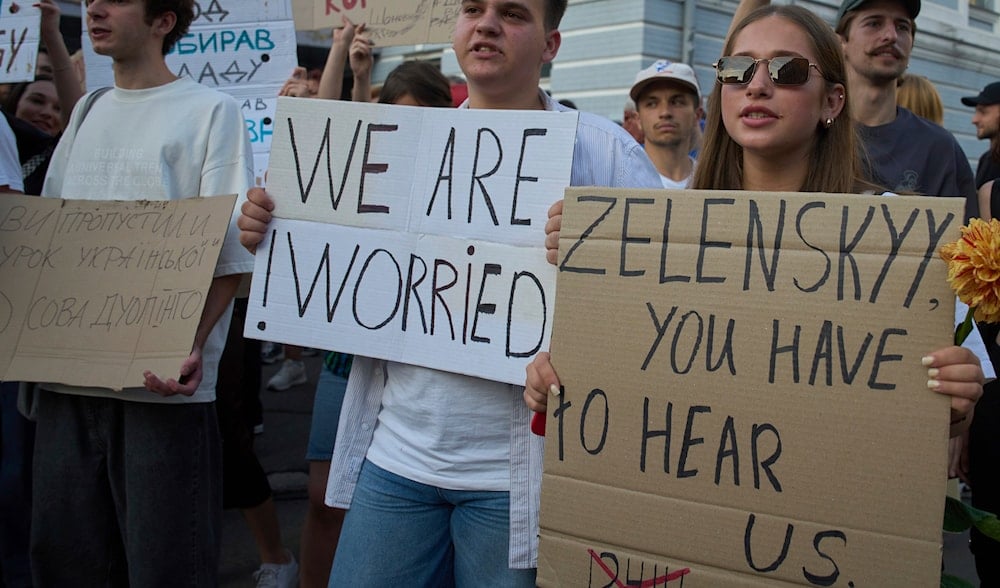Trust in Zelensky drops after anti-corruption reforms spark uproar
A new KIIS poll shows rising public concern over corruption and war strategy, as Zelensky faces his sharpest decline in support since late 2024.
-

Participants hold signs during a protest against a new bill proposed by President Volodymyr Zelensky restoring the independence of the country’s anti-corruption agencies, in Kiev, Ukraine, Thursday, July 24, 2025. (AP)
Ukrainian President Volodymyr Zelensky’s public trust has dropped to its lowest point in six months, following widespread backlash over controversial reforms that sought to curtail the independence of anti-corruption agencies. The findings come from a new survey by the Kiev International Institute of Sociology (KIIS), released Wednesday.
The poll marks the first major measure of public opinion since Zelensky’s government moved to place anti-corruption watchdogs under the authority of a newly appointed prosecutor-general, a decision that triggered rare wartime protests across the country.
The KIIS poll, conducted starting July 23, just one day after the controversial vote, revealed that 58% of Ukrainians now express trust in Zelensky, marking a significant drop from 74% in May and 67% in February-March. His lowest wartime trust rating remains 52%, recorded in December 2024.
Analysts say the dip in support reflects broader concerns beyond the recent scandal. According to KIIS, 21% of those who distrust the president cite corruption, while 20% pointed to his handling of the ongoing war with Russia.
Joining EU contingent on fighting corruption
Fighting corruption reportedly remains a central condition for Ukraine’s bid to join the European Union. Critics of the now-retracted legislation said it risked undermining that progress.
KIIS Executive Director Anton Grushetskyi warned in a research note that while Zelensky still maintains "a fairly high level of trust," the persistent decline is a "worrying signal that requires attention and thoughtful decisions from the authorities."
In a statement following the reversal of the legislation, Zelensky acknowledged the backlash, saying he "respects the position of all Ukrainians." Still, some protesters told Reuters the incident had shifted their views of his leadership.
“On the first day of the protests, I thought about tattooing #12414 simply as a reminder,” said Artem Astaf'yev, a 22-year-old IT worker, referring to the designation of the law. A first-time protester, he added that he likely would not support the Servant of the People party in future elections, though voting remains suspended under martial law.
For others, the public demonstrations offered a hopeful sign. Yuriy Fylypenko, a 50-year-old war veteran, said the protests underscored the strength of Ukraine’s democratic spirit. “We have been convinced that Ukraine is not sleeping, that Ukraine is full of potential to defend democratic principles,” he said.
Ukraine’s anti-corruption crisis triggers protests, EU backlash: FT
Ukrainian President Volodymyr Zelensky faced intense domestic and international backlash last month after signing a controversial law granting the prosecutor-general expanded control over two key anti-corruption institutions: the National Anti-Corruption Bureau and the Specialised Anti-Corruption Prosecutor’s Office.
In a recent report published in the Financial Times (FT), Ivan Krastev stated that these institutions, created in Ukraine in 2013-2014 with strong Western support, have long been seen as cornerstones of Ukraine’s democratic accountability. Zelensky’s move sparked widespread concern that the law would compromise their independence and undermine Ukraine’s anti-corruption efforts.
The decision triggered the most serious diplomatic crisis yet between Kiev and its Western allies, with up to €60 billion in EU-linked financial support placed at risk, according to the report. It added that both the EU and the International Monetary Fund (IMF) expressed alarm at the legislation, signaling that the move could jeopardize future aid disbursements unless reversed.
According to the FT, under mounting pressure from both international institutions and Ukrainian society, Zelensky abruptly reversed course, restoring the agencies’ autonomy. The episode underscored the enduring influence of public protest and international accountability in shaping policy.
The law's passage ignited the largest anti-government protests in Ukraine since the start of the war in 2022. Thousands poured into the streets of Kiev and other cities under banners reading "Corruption kills".
The report highlighted that until now, open criticism of the government during wartime had been considered taboo. The demonstrations marked a breaking point, a moment when civic outrage over corruption and institutional capture outweighed the pressure to maintain national unity at all costs.

 7 Min Read
7 Min Read








